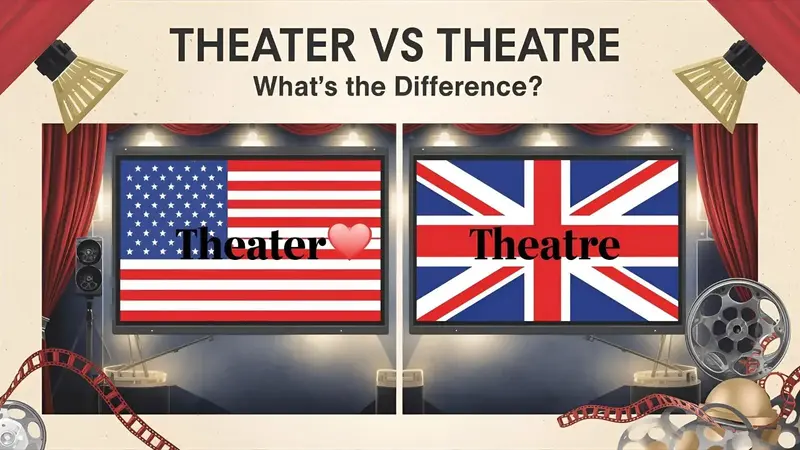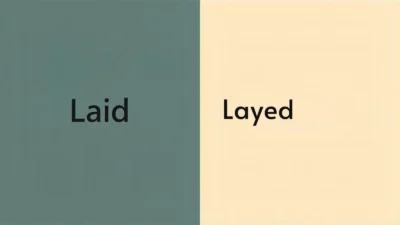Have you ever paused mid-sentence wondering if it’s theater or theatre? If you’re a student, writer, or English learner trying to sound polished and professional, you’re not alone.
This quick guide is written just for you—to clear up the spelling confusion, explain where each version is used, and help you write confidently for any audience.
Let’s settle the theater vs theatre debate once and for all!
🎯 Theater or Theatre – Quick Answer
Both “theater” and “theatre” mean the same thing—a place where plays, films, or performances are shown.
✅ American English: theater
✅ British English: theatre
Examples:
- US: I’m going to the movie theater tonight.
- UK: We booked tickets for the theatre in London.
👉 So, the difference is only in spelling, not in meaning.
🕰️ The Origin of “Theater” and “Theatre”
The word comes from the Greek word “theatron” (θέατρον), meaning a place for viewing. It entered Old French as theatre and then into Middle English during the 14th century.
When English spread to America, spelling simplifications led to changes like:
- colour → color
- centre → center
- theatre → theater
These simplified spellings became part of American English reforms led by figures like Noah Webster in the 19th century. That’s why today, the U.S. uses theater, while the U.K. and Commonwealth countries prefer theatre.
🇬🇧🇺🇸 British English vs American English Spelling
Here’s a simple comparison between the two:
| Region | Preferred Spelling | Example Sentence |
|---|---|---|
| United States | Theater | He studied drama at the New York theater school. |
| United Kingdom | Theatre | The Royal Theatre hosts amazing Shakespeare plays. |
| Canada | Theatre (mostly British) | The theatre downtown is newly renovated. |
| Australia | Theatre | We watched a musical at the Sydney Theatre. |
Tip:
If you’re writing for an American audience, use theater.
If your readers are British, Canadian, or Australian, use theatre.
🧭 Which Spelling Should You Use?
Here’s how to decide based on your audience and context:
- ✍️ Writing for Americans: Always use theater.
- 🇬🇧 Writing for UK/Commonwealth readers: Use theatre.
- 🌍 Writing for international readers: You can choose either—but stay consistent throughout your writing.
👉 Pro tip: Many US venues that perform live plays (not movies) use the old-fashioned “theatre” in their names for artistic effect—like Broadway Theatre.
🚫 Common Mistakes with Theater vs Theatre
Here are frequent mix-ups people make:
| Mistake | Correction | Explanation |
|---|---|---|
| I love going to the theatre to watch new films (US context) | I love going to the theater to watch new films | In the US, “theater” is the correct form. |
| The city built a new theater for stage plays (UK context) | The city built a new theatre for stage plays | In the UK, “theatre” is preferred. |
| Switching between both forms in one article | Be consistent | Pick one form based on your audience. |
📚 Theater or Theatre in Everyday Examples
Here’s how each spelling appears in real-world use:
Emails:
- “Our meeting will be held in the theater hall.” (US)
- “We’re performing at the city theatre next weekend.” (UK)
News Headlines:
- “Local theater group wins national award.” (US)
- “The theatre industry sees record ticket sales.” (UK)
Social Media Posts:
- “Had the best night at the theatre! 🎭” (UK)
- “The theater performance blew my mind! 👏” (US)
Formal Writing:
- “The theatre remains an important cultural institution.” (Academic/UK)
- “The theater arts program is highly competitive.” (Academic/US)
📊 Theater or Theatre – Google Trends & Usage Data
According to Google Trends (as of recent data):
| Country | Most Common Spelling | Popularity (%) |
|---|---|---|
| United States | Theater | 95% |
| United Kingdom | Theatre | 98% |
| Canada | Theatre | 87% |
| Australia | Theatre | 92% |
| India | Theatre | 85% |
Insights:
- Americans overwhelmingly use theater.
- Commonwealth countries stay loyal to theatre.
- Global English learners encounter both forms online, so understanding both is essential.
FAQs About Theater vs Theatre
1. Is “theatre” wrong in the U.S.?
No. It’s not wrong—it’s just less common. Some American venues use theatre for style.
2. Why are there two spellings of the same word?
Because of historical spelling reforms in America and older British traditions.
3. Can I use both spellings in the same document?
It’s best not to. Pick one and stay consistent.
4. Which is older: theater or theatre?
Theatre is the older form, tracing back to French and Latin.
5. Do movies use “theater” or “theatre”?
In the U.S., movies are shown in a theater. In the UK, it’s called a cinema or theatre for stage plays.
6. What about “movie theatre” vs “movie theater”?
Both are correct, but movie theater is more common globally.
7. Is “theatre” more formal?
Some think so, but it’s mainly a regional preference, not a formality issue.
Conclusion🏁
In short, both “theater” and “theatre” are correct—it’s just a matter of where you are and who you’re writing for. 🎭
- Use “theater” for American audiences.
- Use “theatre” for British or Commonwealth readers.
- Above all, be consistent in your writing.
The magic of the word lies not in how it’s spelled, but in the creativity it represents—stories, performances, and emotions shared under one roof. Whether you call it a theater or theatre, the art remains the same. 🌟

I’m Emma Collins, a grammar expert and author at Grammarnestly.com. I love helping readers master English with simple, practical grammar guides.
When I’m not writing, I enjoy reading, coffee, and exploring the beauty of language.



